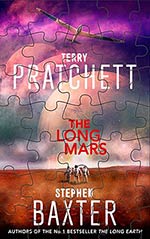
![]() attackofthebooks
attackofthebooks
3/21/2017
![]()
I want to love The Long Mars. I want to love it so much. It's full of ideas, of characters, of wizbang... and it's written by Terry freaking Pratchett (as well as Stephen Baxter).
And yet, something is lacking that leaves me feeling dissatisfied after finishing. The Long Mars, third in The Long Earth series, is missing the tension that would change it from an idea a minute to a page turning adventure. There's no need to even remove any of the ideas -- just the tension to make the reader care. Unfortunately, not only are there too many stories, too many whizbangs, too many characters that get too little screen time or too little sympathy, but there's just not enough to wrap them all together. The world of the Long Earth contains (ironic word, I know) the infinite possibilities for Pratchett and Baxter to work with because not only are there infinite iterations of Earth (and Mars, Jupiter, and so on), but each one is different, opening up nearly limitless potential for stories, adventures, exploration and discovery, and characters. Instead, The Long Mars, not unlike The Long War (The Long Earth #2) before it, feels like a madcap dash of a plot, with Pratchett and Baxter cramming in as many ideas as they can before the editors split the book. Because ultimately, with two more novels in the series to follow, I believe that's what is happening: The Long Earth is really just one long series of ideas and plot lines that the editors have cut up into a five-installment series. As a result, all of the tension that might have lifted The Long Mars is lost with too much going on.
In short, The Long Mars is trying to do too much at once, and it waters down the impact of any one thing that might otherwise make it better.
All that aside, I enjoyed the books. There's a lot to like about The Long Mars. I think exploring all the different possible iterations that the earth's evolutionary track might have taken is fantastic. And what about Mars? How might Mars have gone differently? And what kind of life might have evolved there, or how might life be different on Earth if something had been gone differently here? It's really cool, and that's not even accounting for all of the potential politics.
There are two more books in the series -- The Long Utopia and The Long Cosmos. I look forward to reading both, but I hope that Pratchett and Baxter can do better, or at least be more focused, in these last two novels.
http://www.attackofthebooks.com/book-review-long-mars-terry-pratchett-stephen-baxter-long-earth-3/